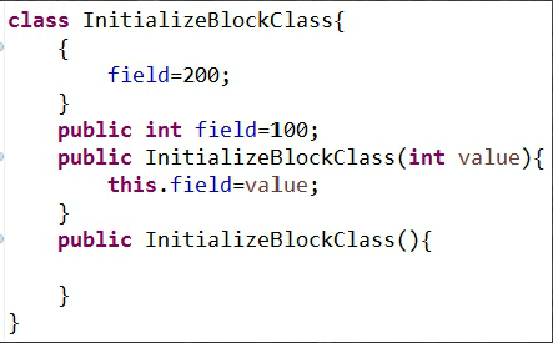一、动手动脑
1.以下代码为何无法通过编译?哪儿出错了?

原因:如果类定义了构造方法Java编译器就不再会提供没有参数的“默认构造方法”。只能匹配“自己”写到构造方法。
2.
请运行TestStaticInitializeBlock.java示例,观察输出结果,总结出“静态初始化块的执行顺序”。
class Root
{
static{
System.out.println("Root的静态初始化块");
}
{
System.out.println("Root的普通初始化块");
}
public Root()
{
System.out.println("Root的无参数的构造器");
}
}
class Mid extends Root
{
static{
System.out.println("Mid的静态初始化块");
}
{
System.out.println("Mid的普通初始化块");
}
public Mid()
{
System.out.println("Mid的无参数的构造器");
}
public Mid(String msg)
{
//通过this调用同一类中重载的构造器
this();
System.out.println("Mid的带参数构造器,其参数值:" + msg);
}
}
class Leaf extends Mid
{
static{
System.out.println("Leaf的静态初始化块");
}
{
System.out.println("Leaf的普通初始化块");
}
public Leaf()
{
//通过super调用父类中有一个字符串参数的构造器
super("Java初始化顺序演示");
System.out.println("执行Leaf的构造器");
}
}
public class TestStaticInitializeBlock {
public static void main(String[] args)
{
new Leaf();
}
}

结论:
1,静态初始化块只执行一次。
2,创建子类型的对象时,也会导致父类型的静态初始化块的执行。
3.使用类的静态字段和构造函数,可以跟踪某个类所创建对象的个数。请写一个类,在任何时候都可以向它查询“你已经创建了多少个对象?”。
public class T1 {
private static int sum=0;
public T1() {
sum++;
}
public static void num() {
System.out.println("你已经创建了"+sum+"个对象");
}
public static void main(String[] args) {
T1 obj = new T1();
T1.num();
}
}

二、
1.使用上页幻灯片中定义的类,以下代码输出结果是什么?



Java字段初始化的规律:
1,执行类成员定义时指定的默认值或类的初始化块,执行前者。
2,当有构造函数时执行类的构造函数。
2.
静态方法中只允许访问静态数据,那么,如何在静态方法中访问类的实例成员(即没有附加static关键字的字段或方法)?请编写代码验证你的想法。
方法:将对象作为参数传递给静态方法!


3.以下代码输出诡异的结果,原因何在?
public class StrangeIntegerBehavior
{
public static void main(String[] args)
{
Integer i1=100;
Integer j1=100;
System.out.println(i1==j1);
Integer i2=129;//false
Integer j2=129;
System.out.println(i2==j2);
}
}

用javap来分析生成class文件,看它调用了Interger类的哪个方法:

然后打开JDK源文件查看源码:
/**
* Cache to support the object identity semantics of autoboxing for values between
* -128 and 127 (inclusive) as required by JLS.
*
* The cache is initialized on first usage. The size of the cache
* may be controlled by the {@code -XX:AutoBoxCacheMax=<size>} option.
* During VM initialization, java.lang.Integer.IntegerCache.high property
* may be set and saved in the private system properties in the
* sun.misc.VM class.
*/
private static class IntegerCache {
static final int low = -128;
static final int high;
static final Integer cache[];
static {
// high value may be configured by property
int h = 127;
String integerCacheHighPropValue =
sun.misc.VM.getSavedProperty("java.lang.Integer.IntegerCache.high");
if (integerCacheHighPropValue != null) {
try {
int i = parseInt(integerCacheHighPropValue);
i = Math.max(i, 127);
// Maximum array size is Integer.MAX_VALUE
h = Math.min(i, Integer.MAX_VALUE - (-low) -1);
} catch( NumberFormatException nfe) {
// If the property cannot be parsed into an int, ignore it.
}
}
high = h;
cache = new Integer[(high - low) + 1];
int j = low;
for(int k = 0; k < cache.length; k++)
cache[k] = new Integer(j++);
// range [-128, 127] must be interned (JLS7 5.1.7)
assert IntegerCache.high >= 127;
}